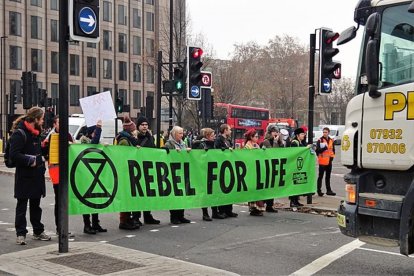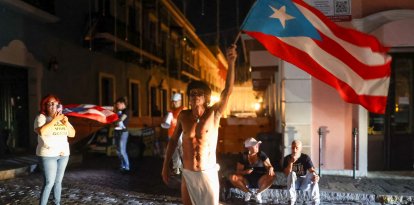Extinction Rebellion group fails in UK, announces it will stop public disturbance actions
The activist network acknowledged in a statement that their demonstrations have not had an impact because "emissions continue to increase."

Extinction Rebellion
After acknowledging that its public disruption actions have had no impact, the British arm of the environmental group Extinction Rebellion has finally announced that it will stop the demonstrations it has been leading in the United Kingdom.
On Sunday, January 31, the organization said it would take a break to attract more people to its campaign to supposedly counter climate change.
The activist network, created in the UK in 2018, regularly uses acts of civil disobedience to denounce government inaction in the face of climate change.
It is a group of people who, among their demonstrations, have included the closure of key roads and bridges in central London, an oil refinery blockade. The breaking of windows at the Barclays bank headquarters and the spraying of fake blood on the Ministry of Finance building.
The group admitted that none of its disruptive actions have brought about change, for which it assured that it will "temporarily move away from public disruption."
The communiqué entitled: "We quit", demonstrates the failure of several nonsense actions that under no circumstances contribute to what they propose: "halt mass extinction and minimise the risk of social collapse."
The group said it would now focus on strengthening its numbers and building bridges to increase its power and influence.
"This year, we prioritise attendance over arrest and relationships over roadblocks, as we stand together and become impossible to ignore," the statement said.
The organization has not only staged several actions for months that have paralyzed the transit of vehicles and people in the United Kingdom, but also disruptive demonstrations in other countries around the world to supposedly raise awareness of the need to combat the climate crisis.
The actions, rather than generating empathy, have harbored resentment and have been deemed as ineffective, because protests such as splashing fake blood on the facade of a Ministry building does not contribute in any way to reducing factors such as the emission of greenhouse gases.
It should be remembered that the British government is in the process of passing a new law to make it more difficult for people to carry out disruptive protests such as stopping public transport networks or disrupting fuel supplies, thus giving the police greater powers to deal with and prevent them in the future.
Extinction Rebellion recently called for a large demonstration on April 21 in front of the British Parliament with which it hopes to gather some 100,000 people.
RECOMMENDATION





















